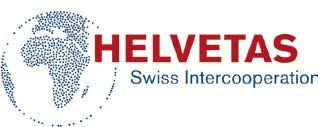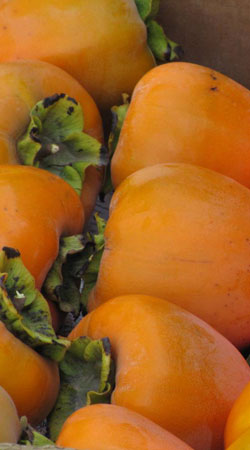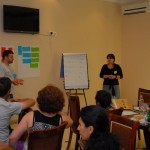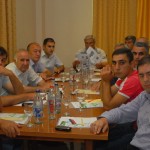On June 1, 2013 “Markets for Meghri” (M4M) project initiated the organization of a Business to Business (B2B) meeting for fruit producers of Meghri region and potential buyers from all over Armenia for the discussion of issues regarding potential cooperation between these parties. More than 60 people participated in this event. The Business to Business meeting took place in Agarak, Meghri region.
The type and strength of linkages formed between different players in the market depends in part on their mutual interest in forming and maintaining agreements, but also on other factors including the physical and institutional environment and the types of products or processes involved. In general, good communications and transport promote stronger linkages between farmers and traders or processors while adequate utility services support the development of agribusinesses near to producers. Successful linkages provide benefits to all members along the value chain. Excellent business management skills are a prerequisite for creating, maintaining and expanding farm-agribusiness linkages. Some products call for closer co-operation between farmers and processors.
There are a number of constraints that negatively affect current farm-agribusiness linkages in Meghri region:
ü actors in Meghri have low access to market information;
ü public services are under-funded so that there is little or no published information on markets, prices, trends, key market players;
ü commercial market research services are rare and costly;
ü weak organization between farmers, high transaction costs for buyers and trust between farmers and buyers is poor;
ü negotiations between farmers and supermarkets (big scale traders) are not founded on long lasting commercial relationships and qualitative logistics management.
Lack of Government’s relevant interventions, absence of agro-insurance, lack of access to financial resources (absence of banks, MFIs, government grants etc.) are also considered as main obstacles. This B2B meeting was organized in order to find the solutions for some of these issues.
Whilst fruits from Meghri have high recognition and good “reputation” over local consumers, the market is undermined by increasing competitive pressure from other regions of Armenia as well as other countries, like Georgia, Iran, Turkey, etc. Many high value markets also remain unexplored or have yet had little impact on the sector in Meghri. This is largely due to:
- long distance to potential markets during which high post-harvest losses occur (the result of poor packaging, no chilling during the transport, wrong handling etc.);
- low standard cold-chain facilities at the region level and on-farm cold storages at farm level ( the latter would allow farmers to store fruits in order to gain volume, reduce degree of spoiled crops as well as negotiate better prices. Now they are forced to sell immediately without proper storage facilities);
- lack of an established post-harvest handling/management techniques, processes including proper harvesting, sorting, storing, packaging, cold transportation etc. leading to high post-harvest losses;
- insufficient investment into existing local processing capacities (namely Meghri Cannery and Meghri Winery plants) as well as new processing business opportunities (due to a number of factors such as the lack of knowledge and information, capital, technology, inputs etc.)
- lack of contractual relationships between farmers and processors/traders and understanding of currently operating business models in this regard;
- lack of coordination and bargaining skills among farmers to negotiate better prices, including lack of trust among market players that negatively influence on their business development;
- lack of sufficient information about market potential and requirements (the flow of information between farmers, traders, processors, retailers/exporters is not well functioning).
This Business to Business meeting was aimed to reach:
- common understanding among stakeholders/upstream operators (participants) the current situation of fruit production in Meghri region;
- common understanding of demanded fruits’ volumes and quality requirement for delivered fresh fruits and processed products;
- clear definition of roles for each involved party: their functions and possible support to business;
- preliminary agreements on further cooperation.
During the event participants have formed three working groups, namely:
- “Dried fruits” group;
- “Fresh fruits” group;
- “Processors” group.
Working groups were formed according to the participants’ spheres of activities and interests. Each working group had a very productive discussion regarding its main obstacles and the ways of overcoming them.
The following recommendations were made both by farmers and the processing/trading companies:
- farmers’ capacity development to be facilitated by the project: improvement of management, organizational, marketing and general entrepreneurship skills; assistance in product diversification;
- reduction of supply chain costs between parties through collaboration, contract negotiation, etc;
- improvement of market access for high value fresh fruits and products through providing better market information for processors and farmers and improving farmers’ quality management skills.
At the end of the event the linkages were established between farmers and the processing and trading companies which should be further developed and flitted to more practical stage-contractual relationships.














